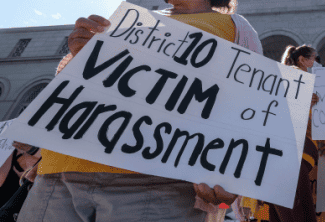Renters Are in Revolt. This Tenant Union Plans to Get Them Organized
The U.S. has largely recovered from the pandemic, but its housing crisis endures.

Meanwhile, the average U.S. rent has increased 18% over the past five years, according to Pew. Millions of Americans worried they’d never be in a financial position to buy a home; now, they’re faced with the startling reality that they may not be able to rent one either.
This crisis has created a new class of Americans: the “rent-burdened.” As homes get more and more expensive, a greater share of the population is renting, especially middle-class people in their 30s and 40s who hoped they would be able to purchase homes by now.
In 2023, the rent-to-income ratio crossed 30% for the first time in more than 20 years, according to Moody’s, meaning that the typical American renter now spends more than 30% of their income on rent and can be classified as rent-burdened. “The cliché that ‘the rent is too damn high’ is really true,” says Peter Dreier, professor of public policy at Occidental College in Los Angeles. “There’s a renters revolt going on all over the country.”
Renters comprise about one-third of the U.S. population, but can make up half or two-thirds of the population in some cities. As more and more corporate behemoths buy up properties from mom-and-pop landlords, much of that rent money is just going directly into corporate coffers: 45% of the total rental units recorded in the 2018 Rental Housing Finance Survey (the most recent one for which there is data) were owned by for-profit companies, according to Pew.
Many of these renters are starting to form tenant unions, grassroots organizations of renters banding together to put pressure on landlords and local governments to protect the rights of tenants. Tenant movements have already led to reforms in Los Angeles, New York, and Miami, among many other expensive, renter-heavy cities. But one of the most effective tenant unions in the country is KC Tenants, in Kansas City, Missouri.
Over the last four years, KC Tenants and their political arm, KC Tenants Power, have blocked thousands of evictions in Kansas City, won tens of millions of dollars of city funding for long-term affordable housing, and grown their ranks to nearly 10,000 members.
Last year, they won a “Right to Counsel” program for renters in Kansas City, ensuring that any tenant facing eviction is guaranteed free legal representation. And in June, four of the six KC Tenant-endorsed candidates for Kansas City City Council (including three incumbents) won their races. Renter Revolt, the latest short documentary from TIME, follows one of the KC Tenants organizers, Jenay Manley, as she campaigns for a City Council seat.
Need Legal Help?
Chat with a real estate lawyer near you. It’s only $5 for a 1-week trial. Ask unlimited questions.
The fight to focus on tenants in the conversation about housing inequality is “a similar struggle to that of the labor movement,” says Tara Raghuveer, founding director of KC Tenants. “We’re moving beyond theories about housing justice and we’re actually providing a human face.” Raghuveer says that KC Tenants is in touch with over 50 other tenant unions around the country, swapping strategies and offering support as they fight for rent regulations and tenants’ rights.
Some of these groups have been in talks with the White House about federal rent policy; the Biden Administration released a blueprint for a potential federal Renters Bill of Rights earlier this year. The goal of the movement, Raghuveer says, is a “wholesale transformation of how we treat housing in this country, from housing treated as a commodity to housing that’s guaranteed as a public good.” In the short term, they’ll settle for federal rent controls.
Source: TIME















 Accessibility
Accessibility